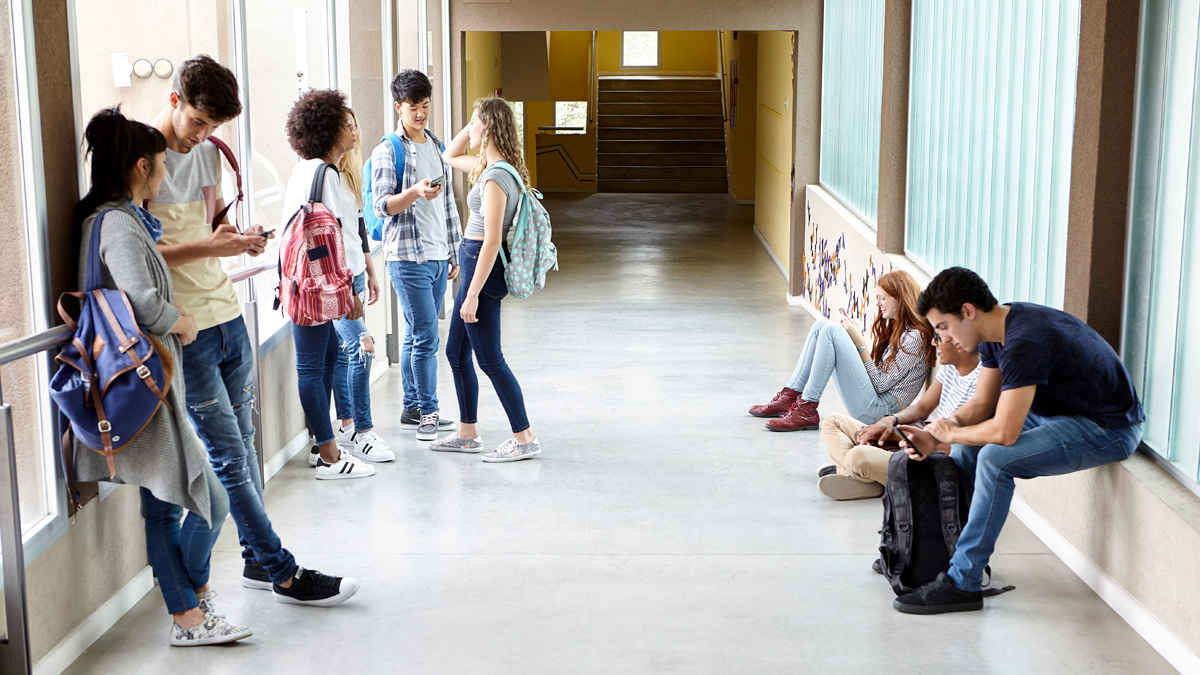A cyber safety company just gave out this list of 10 reasons why mobile phones should be allowed in schools

Remember the days of the old school yard? Picture: Getty Images
It’s the big issue that’s dividing the nation right now – should Israel Folau talk, ever kids have access to mobile phones during school hours?
The Victorian government just said no, they shouldn’t. Mobile phones will be banned from state primary and secondary schools – that’s morning bell to afternoon bell – from the first term of 2020.
One one side is every parent saying “Well I didn’t have a phone during school and I turned out okay”. On the other is every sulky teenager saying “Well you didn’t have a phone during school and look how you turned out”.

There are, as always, outliers on both sides. Nerds, who want to get on with their textbook algos and real print. Helicopter parents with separation anxiety. And beaten-down teachers who really are just sick of it all and don’t care what the kids are doing, as long as they’re quiet for an hour.
We’re not here to judge; just to give you all the information you need to shore up your social media stance on it all.
But if you’re struggling to find an argument for phones in schools, cyber safety company Family Zone (ASX: FZO) is there for you. Well, you and their shareholders, because FZO specialises in managing kids’ online time in a way that keeps everyone happy.
So while it may be a little compromised, FZO actually has been working in this area for a few years, and says while it has been supportive of “out of sight” policies, it actually hasn’t seen blanket bans truly work.
“In fact, we have seen them overturned through parent protest and the bans are often and easily resisted and ignored by parents and students,” it said in a statement to the ASX this morning.
FZO laid out the “practical reality” of it all recently in a submission to a NSW study under way looking at a similar ban.
It summarised those realities in 10 points. And here they are:
- As evidenced through feedback to this week’s Victorian announcement, many educators and experts believe that bans take away an opportunity for students to learn how to self-manage a device and limit opportunities for rich learning experiences.
- Many parents express a need to contact their children for logistics or health reasons.
- Because of desires to be in contact, many parents ignore or are complicit in ignoring school phone bans.
- Many children will ignore mobile phone bans, particularly as they get older, and they can easily hide connected devices in their bags and jackets.
- Often students can readily contact each other including making voice calls on the school mandated iPad or computer (which can run popular social apps like Facebook and WhatsApp).
- Secondary schools include many 18 year old students, able to purchase their own phone plans creating another challenge for parents and schools to enforce bans.
- Increasingly children are taking connected wearables to school such as smart watches, making phone bans irrelevant.
- Increasingly students are turning on WiFi hotspots on mobile phones stored in their bags or pockets, permitting them to easily bypass school policy without being ‘caught’.
- The practicalities of ‘out-of-sight’ policies are enormously challenging. For example, where do schools secure the devices, what happens if they are broken or lost and if devices are required to be stored in lockers, what happens if they’re stolen?
- Mobile phone bans can mask cyber safety challenges and simply push responsibility onto busy and unprepared parents. In many homes, the child’s primary internet connected device is the device required to be purchased by the school causing resentment by parents of cyber issues seemingly being thrust on them by the school.
There. Consider yourself armed and ready for a day of arguing online simply for the sake of arguing online.
Because, really, if you don’t want your kids to have mobile phones at school either a) don’t let them have a mobile phone, or b) don’t let them take it to school.
They (clap) will (clap) still (clap) love (clap) you.
UNLOCK INSIGHTS
Discover the untold stories of emerging ASX stocks.
Daily news and expert analysis, it's free to subscribe.
By proceeding, you confirm you understand that we handle personal information in accordance with our Privacy Policy.








